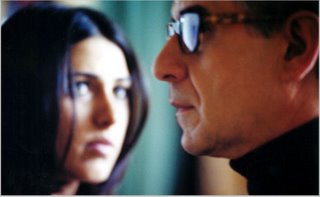 The Consequences of Love, the Italian film released in 2004 and now out from Artificial Eye as a DVD, receives Four Quartets from The T.S. Review.
The Consequences of Love, the Italian film released in 2004 and now out from Artificial Eye as a DVD, receives Four Quartets from The T.S. Review.It is one of the most poised, stylish, suspenseful, and under-stated European films of the last five years, with an extraordinary series of final images that reminds one of Pasolini's Christ, if not for the reasons one might expect.
The central roles are cast perfectly, with Olivia Magnani and Toni Servillo, as the Beatrice-waitress-figure and the Dante-middle-aged-business- traveller, respectively.
I welcome haunting films about isolation, desire, the gaze, despair and transgression set in hotels, Death In Venice perhaps being second only to The Night Porter. Now, add a third classic to this genre.
Revillo invests his face, manner, body and stylish dress with an exhaustive but invigorating melancholia; and Magani is utterly astonishing in her long, languid silence, and speech.
Moving, elegantly but with feline-immediacy, from the most sublimely measured asthetic shots of glowing interiors to hyper-cool chrome-bright, Mecededes-black violence, this is a study in the hot and cold both of the image, and the interior self, and how imagination moderates, or does not, our movements between worlds of love and death.
http://www.artificial-eye.com/consequencesoflove/main.html
Comments